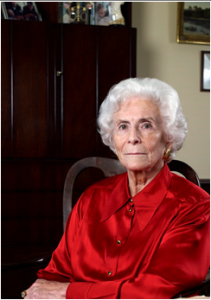Shoshana Rabinowitz 1932-2019
 Written by Professor Yaron Rabinowitz, deputy director of Obstetrics and Gynecology, at the Sheba Medical Center (posted on Facebook)
Written by Professor Yaron Rabinowitz, deputy director of Obstetrics and Gynecology, at the Sheba Medical Center (posted on Facebook)
I, Yaron Rabinowitz, son of Shoshana Rabinowitz, am a second and third generation of the Holocaust.
On the very first day of the German invasion of Vilna, Lithuania, in June, 1941, my grandfather was captured; we later found his name on the list of the first victims in the Ponary Forest near Vilna. My mother, Shoshana was then only eight and a half, when she, my grandmother and the rest of the extended family were squashed together in various apartments in the ghetto. The family remained there until the ghetto was liquidated, "succeeded" in the selection process and most of them perished in the gas chambers. Only three members of the extended family managed to survive the Death March, the camps at Kaiserwald and Stutthof, and were finally liberated by the Russian Army. They arrived in Israel in 1950.
I only heard and read my mother's story in 1991 when she published her book Thanks to My Mother (Wounds that never Healed). The book was translated from Hebrew into German, English and Polish and over 100,000 copies were sold worldwide. My mother lectured all over the world, but particularly in Europe, in order to preserve the memory of her family and the memory of all the victims of the Holocaust.
My mother also participated in a play all over the world. The play is called "The Last Witnesses"; it was written by my brother, Doron Rabinowitz, a writer and journalist living in Austria, who writes about Anti-Semitism and the war. The play deals with the testimonies of Holocaust survivors who appear on stage and testify to the horrors of the Holocaust.
One of the climaxes of my mother's activities to preserve the memory of the Holocaust was an invitation from the Austrian government to appear before the Austrian parliament on Yom Hashoa'h in the play my brother had written. My mother's address to the parliament was broadcast live on TV; what she said accompanies me to this very day and should accompany us all: recalling the memories, time after time, causes nightmares and sleeplessness. However I do it, for one reason and one reason only. All those who were on their march to death told us to tell about what had happened to them so that the world would know and never forget. She also added: I stand here before the Austrian people against all the liars who try to tarnish our memory and the memory of the Holocaust that befell us.
An excerpt from Shoshana Rabinowitz's diary on the pain of leaving the family home for the Vilna Ghetto
Loudspeakers blared through the streets of Vilna announcing that the following day all the Jews would be moved to the ghetto…..there was no decision or discussion in our family. Since this fateful announcement was broadcast over loudspeakers, we started preparing for the journey. Sometime earlier, my mother had collected all her jewelry and gold coins. She sewed the jewelry and cash into her overcoat, into the fur collar of my coat, into the hemline of Dolka's coat and into the shoulder pads of Yulek's coat.
Then we went into our bedrooms and started to pack items that we could take with us. We didn't know if we would be able to return to take more, so we decided to pack the most important things first.
We packed a few clothes for each of us, bed linen, towels, soap and some food. We made a few more packages in case we could return to collect them. The valuable items from Grandma's place were left with the Shterl's, our good neighbors. We hoped that, in the time of need, we would be able to exchange these things or sell them to buy food….
It was most difficult for my grandfather. He had built this house and cherished it all his life. Every object in the house bore memories for him. He had rare, valuable books, silver and porcelain dishes …things that were part of his life and he was very proud of his reputation, of what he had attained in his home, his shop and the glove-making factory he had built.
All that was left now was his home and he was going to lose it too. His daughters helped him pack but there were constant arguments. He wanted to take everything but there was a limit to what an elderly man could carry on his back. His daughters advised him to take only personal items and to give up the memories, the pictures, the gifts, the mementoes, the parts of his life. With every memento I could see him shrink a little more.
Source: Shoshana Rabinovici: Thanks to My Mother, Yad Vashem, Jerusalem, 1991 pp.34-35

